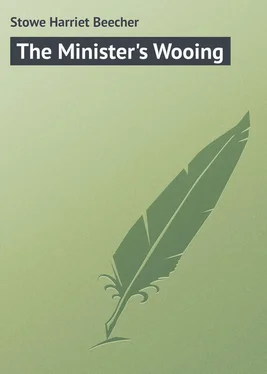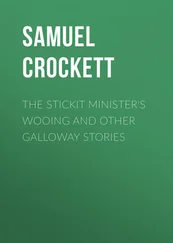Harriet Stowe - The Minister's Wooing
Здесь есть возможность читать онлайн «Harriet Stowe - The Minister's Wooing» — ознакомительный отрывок электронной книги совершенно бесплатно, а после прочтения отрывка купить полную версию. В некоторых случаях можно слушать аудио, скачать через торрент в формате fb2 и присутствует краткое содержание. ISBN: , Издательство: Иностранный паблик, Жанр: foreign_prose, на английском языке. Описание произведения, (предисловие) а так же отзывы посетителей доступны на портале библиотеки ЛибКат.
- Название:The Minister's Wooing
- Автор:
- Издательство:Иностранный паблик
- Жанр:
- Год:неизвестен
- ISBN:http://www.gutenberg.org/ebooks/47958
- Рейтинг книги:4 / 5. Голосов: 1
-
Избранное:Добавить в избранное
- Отзывы:
-
Ваша оценка:
- 80
- 1
- 2
- 3
- 4
- 5
The Minister's Wooing: краткое содержание, описание и аннотация
Предлагаем к чтению аннотацию, описание, краткое содержание или предисловие (зависит от того, что написал сам автор книги «The Minister's Wooing»). Если вы не нашли необходимую информацию о книге — напишите в комментариях, мы постараемся отыскать её.
The Minister's Wooing — читать онлайн ознакомительный отрывок
Ниже представлен текст книги, разбитый по страницам. Система сохранения места последней прочитанной страницы, позволяет с удобством читать онлайн бесплатно книгу «The Minister's Wooing», без необходимости каждый раз заново искать на чём Вы остановились. Поставьте закладку, и сможете в любой момент перейти на страницу, на которой закончили чтение.
Интервал:
Закладка:
Her children had grown up successively around her, intelligent and exemplary. Her eldest son was mathematical professor in one of the leading colleges of New England. Her second son, who jointly with his father superintended the farm, was a man of wide literary culture and of fine mathematical genius; and not unfrequently, on winter evenings, the son, father, and mother worked together, by their kitchen fireside, over the calculations for the almanac for the ensuing year, which the son had been appointed to edit.
Everything in the family arrangements was marked by a sober precision, a grave and quiet self-possession. There was little demonstrativeness of affection between parents and children, brothers and sisters, though great mutual affection and confidence. It was not pride, nor sternness, but a sort of habitual shamefacedness, that kept far back in each soul those feelings which are the most beautiful in their outcome; but after a while, the habit became so fixed a nature, that a caressing or affectionate expression could not have passed the lips of one to another without a painful awkwardness. Love was understood, once for all, to be the basis on which their life was built. Once for all, they loved each other, and after that, the less said the better. It had cost the woman’s heart of Mrs. Marvyn some pangs, in the earlier part of her wedlock, to accept of this once for all , in place of those daily out-gushings which every woman desires should be like God’s loving kindness, ‘new every morning;’ but hers, too, was a nature strongly inclining inward, and, after a few tremulous movements, the needle of her soul settled, and her life-lot was accepted, – not as what she would like or could conceive, but as a reasonable and good one. Life was a picture painted in low, cool tones, but in perfect keeping; and though another and brighter style might have pleased better, she did not quarrel with this.
Into this steady, decorous, highly-respectable circle, the youngest child, James, made a formidable irruption. One sometimes sees launched into a family circle a child of so different a nature from all the rest, that it might seem as if, like an aërolite, he had fallen out of another sphere. All the other babies of the Marvyn family had been of that orderly, contented sort who sleep till it is convenient to take them up, and while awake suck their thumbs contentedly and look up with large, round eyes at the ceiling when it is not convenient for their elders and betters that they should do anything else. In farther advanced childhood, they had been quiet and decorous children, who could be all dressed and set up in chairs, like so many dolls, of a Sunday morning, patiently awaiting the stroke of the church-bell to be carried out and put into the waggon which took them over the two miles’ road to church. Possessed of such tranquil, orderly, and exemplary young offshoots, Mrs. Marvyn had been considered eminent for her ‘faculty’ in bringing up children.
But James was destined to put ‘faculty,’ and every other talent which his mother possessed, to rout. He was an infant of moods and tenses, and those not of any regular verb. He would cry of nights, and he would be taken up of mornings, and he would not suck his thumb, nor a bundle of caraway-seed tied in a rag and dipped in sweet milk, with which the good gossips in vain endeavoured to pacify him. He fought manfully with his two great fat fists the battle of babyhood, utterly reversed all nursery maxims, and reigned as baby over the whole prostrate household. When old enough to run alone, his splendid black eyes and glossy rings of hair were seen flashing and bobbing in every forbidden place and occupation. Now trailing on his mother’s gown, he assisted her in salting her butter by throwing in small contributions of snuff or sugar, as the case might be; and again, after one of those mysterious periods of silence which are of most ominous significance in nursery experience, he would rise from the demolition of her indigo-bag, showing a face ghastly with blue streaks, and looking more like a gnome than the son of a respectable mother. There was not a pitcher of any description of contents left within reach of his little tiptoes and busy fingers that was not pulled over upon his giddy head without in the least seeming to improve its steadiness. In short, his mother remarked that she was thankful every night when she had fairly gotten him into bed and asleep: James had really got through one more day and killed neither himself nor any one else.
As a boy, the case was little better. He did not take to study, yawned over books, and cut out moulds for running anchors when he should have been thinking of his columns of words in four syllables. No mortal knew how he learned to read, for he never seemed to stop running long enough to learn anything; and yet he did learn, and used the talent in conning over travels, sea-voyages, and lives of heroes and naval commanders. Spite of father, mother, and brother, he seemed to possess the most extraordinary faculty of running up unsavoury acquaintances. He was a hail-fellow well-met with every Tom and Jack and Jim and Ben and Dick that strolled on the wharves, and astonished his father with minutest particulars of every ship, schooner, and brig in the harbour, together with biographical notes of the different Toms, Dicks, and Harrys, by whom they were worked.
There was but one member of the family that seemed to know at all what to make of James, and that was their negro servant, Candace.
In those days, when domestic slavery prevailed in New England, it was quite a different thing in its aspects from the same institution in more southern latitudes. The hard soil, unyielding to any but the most considerate culture, the thrifty, close, shrewd habits of the people, and their untiring activity and industry, prevented, among the mass of the people, any great reliance on slave labour. It was something foreign, grotesque, and picturesque in a life of the most matter-of-fact sameness: it was even as if one should see clusters of palm-trees scattered here and there among Yankee wooden meeting-houses, or open one’s eyes on clumps of yellow-striped aloes growing among hardhack and huckleberry bushes in the pastures.
Added to this, there were from the very first, in New England, serious doubts in the minds of thoughtful and conscientious people in reference to the lawfulness of slavery; and this scruple prevented many from availing themselves of it, and proved a restraint on all, so that nothing like plantation-life existed, and what servants were owned were scattered among different families, of which they came to be regarded and to regard themselves as a legitimate part and portion, – Mr. Marvyn, as a man of substance, numbering two or three in his establishment, among whom Candace reigned chief. The presence of these tropical specimens of humanity, with their wide, joyous, rich physical abundance of nature and their hearty abandon of outward expression, was a relief to the still clear-cut lines in which the picture of New England life was drawn, which an artist must appreciate.
No race has ever shown such infinite and rich capabilities of adaptation to varying soil and circumstances as the negro. Alike to them the snows of Canada, the hard, rocky land of New England, with its set lines and orderly ways, or the gorgeous profusion and loose abundance of the Southern States. Sambo and Cuffy expand under them all. New England yet preserves among her hills and valleys the lingering echoes of the jokes and jollities of various sable worthies, who saw alike in orthodoxy and heterodoxy, in Dr. This-side and Dr. That-side, only food for more abundant merriment; – in fact, the minister of those days not unfrequently had his black shadow, a sort of African Boswell, who powdered his wig, brushed his boots, defended and patronized his sermons, and strutted complacently about, as if through virtue of his blackness he had absorbed every ray of his master’s dignity and wisdom. In families, the presence of these exotics was a godsend to the children, supplying from the abundant outwardness and demonstrativeness of their nature that aliment of sympathy so dear to childhood, which the repressed and quiet habits of New England education denied. Many and many a New Englander counts among his pleasantest early recollections the memory of some of these genial creatures, who by their warmth of nature were the first and most potent mesmerizers of his childish mind.
Читать дальшеИнтервал:
Закладка:
Похожие книги на «The Minister's Wooing»
Представляем Вашему вниманию похожие книги на «The Minister's Wooing» списком для выбора. Мы отобрали схожую по названию и смыслу литературу в надежде предоставить читателям больше вариантов отыскать новые, интересные, ещё непрочитанные произведения.
Обсуждение, отзывы о книге «The Minister's Wooing» и просто собственные мнения читателей. Оставьте ваши комментарии, напишите, что Вы думаете о произведении, его смысле или главных героях. Укажите что конкретно понравилось, а что нет, и почему Вы так считаете.












